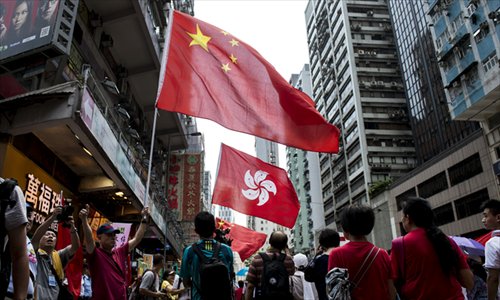Thousands protest HK’s Occupy Central
Fears economy will be affected by sit-in

People hold Chinese national flags and a Hong Kong regional flag as they take part in a march against the Occupy Central movement in Hong Kong on Sunday. Photo: AFP
Tens of thousands of people Sunday turned out in Hong Kong to protest against the upcoming Occupy Central movement that threatens to shut down the city's business hub amid debates over ways to select candidates for the 2017 chief executive election.
The rally, organized by the Alliance for Peace and Democracy, who claimed to have mustered 193,000 participants, marked the climax of the anti-Occupy Central movement following the alliance's month-long petition. The alliance said the petition gathered close to 1.5 million signatures in opposition to the Occupy movement deemed by many as harmful to Hong Kong's social stability and economic development.
"It has been a successful and peaceful rally that has reflected Hong Kong people's stance against the Occupy Central movement and desire for a peaceful election in 2017," alliance spokesperson Robert Chow Yung told the Global Times on Sunday night.
The city government Sunday said it welcomes and supports all activities which take forward the implementation of universal suffrage for the chief executive election in 2017 in accordance with the law and opposes all unlawful acts that affect social order and the betterment of people.
The Occupy Central movement, initiated by scholar Benny Tai Yiu-ting, threatens to paralyze Hong Kong's financial district with a mass sit-in to bargain for their demand that candidates of the 2017 Hong Kong leader election be selected through public nomination.
Noting that a shortlist for candidates should be approved by a nominating committee, Hong Kong and Beijing officials repeatedly said that civic nomination is not in accordance with the Basic Law.
The Occupy movement organizers in June organized an unofficial "referendum" and claimed to have collected around 800,000 ballots, followed by the July 1 pro-Occupy Central march which the Civil Human Rights Front claimed to have gathered 500,000 supporters.
The pro-democracy camp may begin occupying Central in September as Alex Chow Yong-kang, secretary general of the Hong Kong Federation of Students, warned of strikes at schools and universities if public nomination of candidates is ruled out in the reform framework to be released by the National People's Congress (NPC) Standing Committee at the end of August, reported the South China Morning Post (SCMP).
Concern quickly arose among the Hong Kong public and government officials that the campaign may turn into violence that could hurt Hong Kong's economy and halt the city's democracy progress.
Chief Executive Leung Chun-ying on Friday signed the petition to endorse the anti-Occupy movement, stressing his hope that the universal suffrage could take place as scheduled in 2017, and that all illegal actions against the Basic Law should be forbidden, Hong Kong-based The Standard reported.
Beijing's top representative in the city, Zhang Xiaoming, also expressed his support by citing the petition as "doing Hong Kong a great favor" and "reflecting genuine and strong public opinion."
"We want universal suffrage to be held peacefully … We oppose the Occupy Central movement and we don't want violence," said a protester at the anti-Occupy Central march, reported Hong Kong Cable Television.
Another protester at the Sunday rally, which lasted around four hours, said he agrees with the demands raised by the Occupy Central, but fears that the protest may turn into turmoil.
"The silent majority of the public has taken to the streets and voiced their opinions," said Gu Minkang, an associate dean of the School of Law at the City University of Hong Kong, also a participant at the rally.
"The strong turnout represents the Hong Kong people's desire for the 2017 election to be held smoothly and we don't want violence to happen in the Occupy Central movement that could affect Hong Kong's economy," noted Gu.
Gu expects the city's legislators will take the rally turnout into consideration when they are to vote for the reform package which needs a two-thirds majority in the legislature to pass.
The Sunday protest was also joined by government adviser Cheung Chi-kong, legislator and Hong Kong's former security chief Regina Ip Lau Suk-yee and Chan Wing-kee, a business tycoon and member of the Standing Committee of the Chinese People's Political Consultative Conference.
The march remained largely peaceful, except for a counter-protest by about a dozen people including members of People Power, a radical political party in Hong Kong, which saw the two sides shouting and swearing at each other.
Zhang, head of the central government's liaison office to the city, met Democratic Party lawmakers on Friday, and will continue to meet with other pan-democrat lawmakers at separate group meetings to discuss political reform.
He is expected to join Li Fei, who chairs the NPC's Hong Kong Special Administrative Region Basic Law Committee, for a meeting in Shenzhen on Thursday in which all 70 Hong Kong lawmakers are invited, reported the SCMP.